To mark International Clinical Trials Day (20 May) we reflect on the ALS Clinical Trials Guidelines workshop that took place in March. The MND Association co-sponsored this successful meeting, held at Airlie House in Virginia USA. Approximately 140 delegates from across the world attended, including 11 MND researchers and doctors from the UK.
Why was this meeting held?
The meeting was a key stage in the process to update (and improve) international guidelines for clinical trials in amyotrophic lateral sclerosis (ALS, the most common form of MND).
The first international ALS clinical trials guideline workshop took place in 1998. The guidelines were designed to improve the quality of clinical trials in ALS, and provide evidence based recommendations to those designing and carrying out all stages of clinical trials.
What was discussed?
Part of the workshop looked at how clinical research studies are designed: including whether participant eligibility criteria should be restricted and how to take into account the variability of ALS (such as the possible sub-types of ALS and differences in speed of disease progression).
Clinical trials are traditionally set up in several phases or parts. Phases 1 and 2 test safety and help design the later stages of trials (such as working out the optimal dosage of the drug). Phase 3 trials test treatment effectiveness. At the workshop there was much discussion over the ideal design of phase 2 and phase 3 trials. As we learn more about the variability of MND, there is increasing likelihood that future phase 2 trials shift from their traditional purpose, and are designed to also assess the effectiveness of a trial treatment.
In the last decade there have been a long list of drugs tested in large phase 2 and 3 trials which have failed to show positive results. Looking at why these were unsuccessful, and learning lessons from them, could help in the design of future phase 3 trials.
Dr Brian Dickie, Director of Research Development at the MND Association who attended the workshop, commented on another area which was discussed:
“The use of biomarkers in clinical trials is a new area that was not really a part of the original guidelines. Potential biomarkers for diagnosing and tracking MND are currently under investigation. Including a biomarker element in future clinical trials will help us to learn more about the disease and identify participants most likely to benefit from the drug under investigation.”
Trial leaders of tomorrow
We also supported the attendance of four young UK clinician-scientists in order to provide them with an exceptional learning, networking and development opportunity. They have given us a few thoughts on the meeting and what they feel they have gained from attending this workshop.
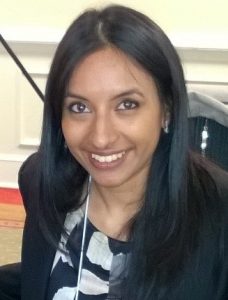
Dr Rebecca Broad (University of Sussex, Brighton): It was a fantastic learning opportunity and has fuelled my enthusiasm to continue being involved in ALS research. It also helped me to put my own research in perspective and has sparked new ideas of ways to analyse my data. It truly felt like a landmark event in the history of ALS research.
Dr Rubika Balendra (University College London): I particularly enjoyed meeting and hearing from such a range of participants, including patients with ALS, drug regulatory agencies, statisticians, pharmaceutical companies, charities and clinical experts in MND and other disease areas. It became clear over the three days that integrating the wealth of expertise across these contributors is the key to driving research forwards.
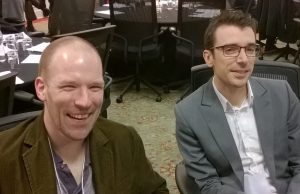
Dr Malcolm Proudfoot (University of Oxford): The discussions at the meeting were hugely encouraging with respect to my own work (investigating the use of magnetoencephalography scans as a potential biomarker). The value added by people with ALS at every step in the formation of recommendations was also noticeable.
Dr Johnathan Cooper-Knock (University of Sheffield): Interacting with, and being part of, the global community of experts in the care for ALS patients was the definite highlight. I have been to many scientific meetings but this was different – everybody in the room had a direct focus on the clinic and on obtaining new, effective treatments for ALS. I have an understanding of where the field needs to go in future – of what is needed to stay nimble enough to test a large number of therapies whilst maintaining the rigour to know when we have found an effective drug.
The slides and audio of the workshop are available online.
For more information on clinical trials:
- Visit our website
- View the Clinical trials information sheet
- For details of current clinical trials visit www.clinicaltrials.gov (search for amyotrophic lateral sclerosis or motor neurone disease)


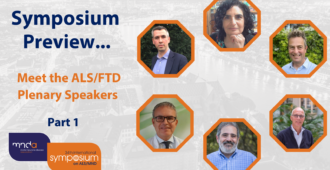
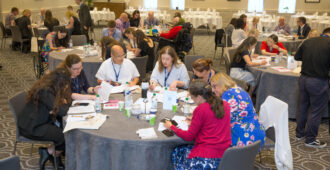
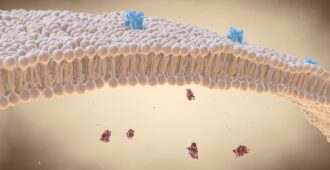
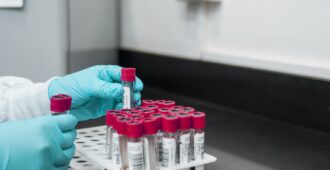
How do these changed guidelines improve the life experience of those living with MND/ ALS ?
Dear Monica,
Thank you for your comment. Changing and updating the guidelines are directly important to people with MND/ALS – and people with ALS we at the meeting to put across their perspective on clinical trials.
The criteria for taking part in clinical trials is usually quite strict and sometimes restricted to those newly diagnosed, but there could be the potential in future trials to include people who are further along in disease progression (and may be using NIV for example). Including a biomarker element in trials gives a better indicator of if a drug is effective. If effect is seem then the time taken to get through to later stages of testing might be shorter. Testing efficacy in Phase 2 may show if a drug is particularly effective in a sub-group of participants, for example those with a certain gene mutation, or slow progressors (compared to fast progressors). In future, this will help in targeting the right drug to the right patient.
If you have any further questions on this please email research@mndassociation.org
Kind regards
Sara Bolton
MND Association, UK